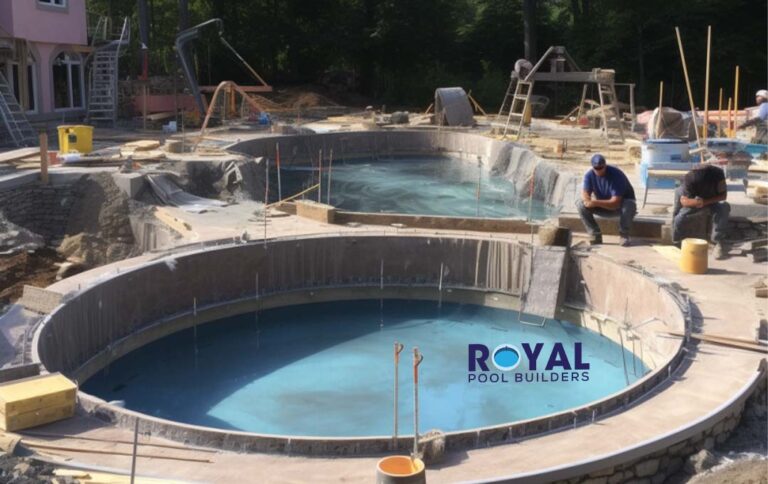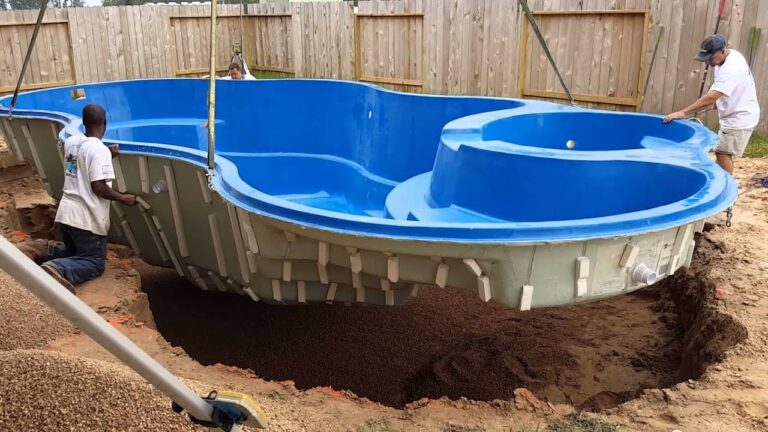Pool Building in NJ requires a permit depending on where you live and the size and type of pool you are building. In general, you will need to obtain a building permit for commercial and residential properties and possibly other permits before starting construction on a pool in New Jersey.
To get a building permit for a pool, you will typically need to submit plans and specifications for the pool, including details about the materials to be used, the pool’s size and depth, and the pool’s location on your property(we can do that for you). You may also need to provide evidence that the pool will meet local zoning, building, and safety codes.

In addition to a building permit, you may need to obtain other permits, such as electrical, plumbing, or grading permits, depending on the scope of your pool project. It is a good idea to check with your local building department or municipality to find out about specific pool permit requirements in your area. They will be able to tell you what types of permits you need and how to apply for them.
Types of Pool
- Commercial Pool
It means a body of water in an artificial or semi-artificial receptacle or another container, whether indoors or outdoors, used or intended to be used for public or semipublic swimming by adults or children or both adults and children, whether or not any charge or fee is imposed on such adults or children, operated and maintained by any person, whether he is an owner, lessee, operator, licensee, or concessionaire, exclusive of the various family pools as defined below.
- Family Permanent Pool
Basically an inground pool that is built above or below grade. These are permanent and can’t be stored away during winters. They also have a depth greater than 24 inches & a water surface level of 100 sq ft. These are specifically family pools, and are not to be used commercially under any circumstances.
- Family Portable Pool
It means a swimming pool made of plastic or other lightweight materials that can be easily dismantled, stowed or transported that contains at least 1,000 gallons of water and has a depth greater than 24 inches, a water surface area of at least 100 square feet, and that is used or intended to be used solely by the owner or lessee thereof and his family and friends invited.
- Wading Pool
It means a swimming pool that meets all of the characteristics and requirements established for portable family pools, with the exception that it holds less than 1,000 gallons of water, has a water depth of fewer than 24 inches and has a water surface area of less than 100 square feet.
What Are the General Pool Requirements?
There are several requirements if you want to add a pool to your property. For starters, the application must begin with the Building Department if the pool is taller than 24″ (inches).
In terms of zoning, you must submit a zoning permit application together with your building application, along with a $75.00 cost. There will also be two property surveys. One copy should precisely depict existing property conditions, while the second should depict the size of the pool and its planned location.
All pools must follow the following rules:
- Pools must be at least ten feet away from your home.
- Pools must be at least 15 feet away from the property lines on the back and sides.
- Pools must be maintained.
- Pools must be properly screened and fenced, so they do not negatively impact neighboring properties.
- With the exception of in-pool lights, lighting that extends the hours of operation cannot be placed.
- Pool equipment must be kept at least 5 feet from any property line.
- Pools must be kept at least five feet away from any shed, garage, or swing set.
- Pools contribute to the total impervious covering of your property. Each property is allowed a certain amount of impervious coverage, which varies by zoning district and is calculated as a proportion of the site’s overall size.
- Any pool larger than 300 square feet in size must be reviewed by an engineer to ensure compliance with the Township’s Stormwater Management ordinance.
Construction Permit Required to Comply With Zoning Regulations
- Before beginning work on the construction of a permanent family pool or commercial pool, or on any alteration, addition, remodeling, or another improvement to a permanent family pool or commercial pool, a permit from the Construction Official must be obtained, which permits must be approved and countersigned by the Plumbing Subcode Official before being delivered to the applicant.
- A permit application must be lodged with the Construction Official on forms given by the Construction Official. The Construction Official shall file a copy of the request with the Secretary of the Board of Health and the Plumbing Subcode Official, along with plans and specifications for all plumbing work to be used for filling, recirculating, and disposing of the water and any other plumbing work that may be required.
Pool Discharge Into Sanitary Sewer System
Discharging pool water into a sanitary sewer system is generally not recommended. Pool water is typically treated with chemicals such as chlorine and pH adjusters, which can harm the environment if released into a sewage treatment plant. In addition, pool water often contains bacteria and other contaminants that can cause problems in the sewage treatment process.
- If you need to discharge pool water, it is usually better to do so onto your lawn or a storm drain. This allows the water to be filtered by the soil, which can help remove some chemicals and contaminants. You should also be mindful of any local laws or regulations that may prohibit the discharge of pool water into certain areas.
- If you are considering discharging pool water into a sanitary sewer system, it is a good idea to check with your local building department or municipality to find out about specific regulations and requirements. They may be able to guide you on how to discharge pool water in your area properly.
Above-Ground Electrical Pool Requirements
Electrical requirements for above-ground pools vary depending on the size and type of pool you have and local building codes. In general, however, there are a few basic electrical requirements that you should be aware of if you are installing an above-ground pool:
- The pool must be equipped with a grounding conductor. This is a wire that helps to protect against electrical shock by providing a path for electrical current to follow in case of a fault.
- The pool must be connected to a grounding electrode, such as a metal rod or plate, that is buried in the ground near the pool.
- The pool must be equipped with a properly sized and installed electrical circuit. The circuit should be dedicated to the pool and should be protected by a ground fault circuit interrupter (GFCI).
- The pool must have a switch or circuit breaker that is easily accessible to the user so that the pool can be quickly and safely shut off in case of an emergency. It is important to have an electrician install the electrical system for your above-ground pool to ensure that it meets all safety requirements and codes. You should also consult your local building department or municipality to find out about specific electrical requirements for above-ground pools in your area.
Wrapping it Up
Pool permits are important for several reasons. One of the main reasons is safety. Local building codes and regulations are designed to ensure that pools are constructed in a way that is safe for those who use them.





